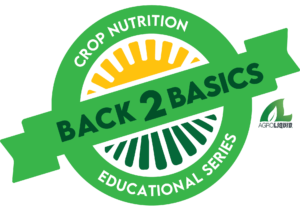Back 2 Basics
A Video Series from AgroLiquid
Managing and Influencing Cations with Soil Amendments

When your soil’s base saturation gets out of balance, there are several soil amendments available to help correct that imbalance and restore optimal nutrient conditions. Base saturation refers to the percentage of soil cation exchange sites occupied by calcium, magnesium, potassium, sodium, and sometimes hydrogen. When these cations are out of proportion, crop growth and soil health can be affected.
Soil amendments work by shifting the balance—moving excess or undesirable cations off soil colloids and replacing them with more favorable ones. For example, if calcium levels are too high, applying the right amendment can reduce calcium and increase magnesium or potassium where needed.
However, a successful amendment depends on your soil’s ability to move cations—drainage issues can prevent nutrient movement and cause buildup. That’s why addressing drainage is often a first step before applying amendments.
Different amendments target specific imbalances:
- High calcium soils needing more potassium and magnesium benefit from K-Mag applications.
- Soils high in sodium but low in calcium respond well to gypsum (calcium sulfate), which displaces sodium and adds calcium.
- Low magnesium soils can be corrected with Epsom salts, while low calcium soils need high-calcium lime.
- Elemental sulfur is useful in high-pH soils to help release bound cations and lower pH.
- Potassium deficiencies can be addressed with potash products like Muriate of Potash (MOP or “double O 60”), which acts both as a nutrient and a soil amendment.
Applying the right amendment tailored to your soil’s unique imbalance is crucial. For instance, using magnesium-based lime when magnesium is low helps restore balance without causing further issues.
Many soil tests include recommendations on amendments, giving you a clear starting point for correcting imbalances. Often, multiple amendments may be needed to fully address soil nutrient imbalances.
Investing in a comprehensive soil test—typically $25 to $30—can save you thousands of dollars in unnecessary fertilizer costs and improve your soil’s overall fertility.


